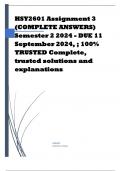HSY2601 Assignment 3
(COMPLETE ANSWERS)
Semester 2 2024 - DUE 11
September 2024, ; 100%
TRUSTED Complete,
trusted solutions and
explanations.
ADMIN
[COMPANY NAME]
, HSY2601 Assignment 3 (COMPLETE ANSWERS)
Semester 2 2024 - DUE 11 September 2024, ; 100%
TRUSTED Complete, trusted solutions and explanations.
Analyse and characterise the relationship between the modern
nation-state and nationalism in the 19th century.
The relationship between the modern nation-state and
nationalism in the 19th century is complex and deeply
interwoven. Nationalism, as a powerful ideology and political
movement, played a crucial role in the formation, consolidation,
and identity of modern nation-states during this period. Here’s
an analysis of how these two concepts were interlinked:
1. Emergence of the Modern Nation-State
The 19th century witnessed the emergence and solidification of
the modern nation-state as a dominant political entity. The
nation-state is characterized by a defined territory, centralized
governance, and a sense of shared identity among its citizens.
The century saw the decline of empires and multi-ethnic
kingdoms, which gave way to more homogeneous political units
where sovereignty was increasingly associated with the notion
of the people or the nation.
2. Rise of Nationalism
Nationalism became a significant ideological force in the 19th
century, advocating for the alignment of political and national
boundaries. Nationalists argued that each nation—a group of
people sharing common language, culture, and history—should
have its own state. This ideology fueled movements for




